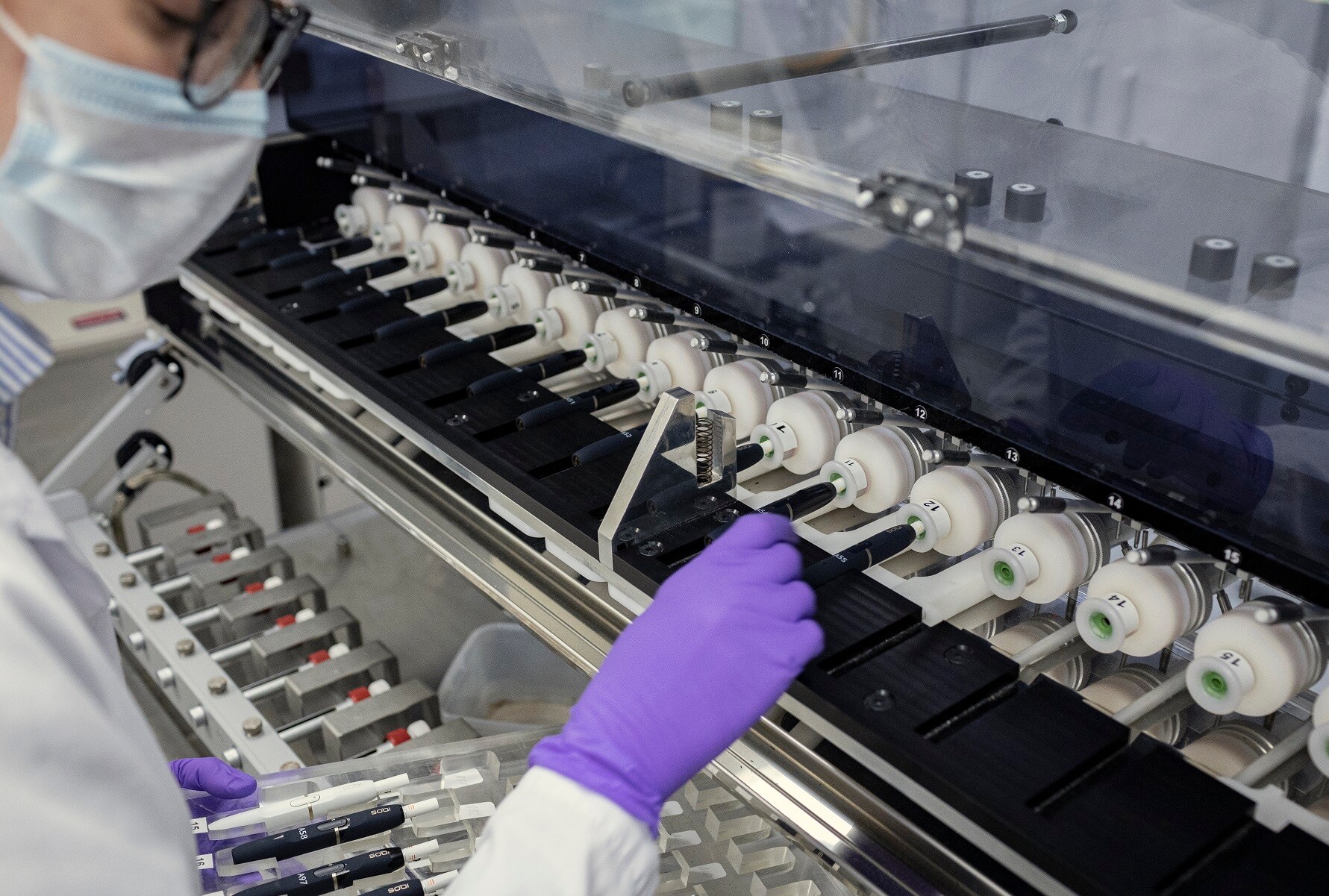Developing and commercializing products that meet stringent scientific requirements and technical design criteria are critical to a smoke-free future. By maintaining and continuously improving the reliability of our products while complying with regulations, we reduce waste, protect our reputation, and build brand equity.
Robust quality management systems (QMS) are deployed to cover, control, and improve the entire product development and deployment life cycle. Governance and accountability for consistent product integrity, quality, and reliability sit at the highest senior management levels under the leadership of the Senior Vice President, Research & Development at PMI, and are guided by our QMS, as well as by other internal and external standards. Work on product integrity and reliability is mainly carried out by teams in our product development, procurement, manufacturing operations, commercial, and quality organization departments. Their collective efforts ensure that we preserve quality, from raw material to the retail shelf.
We work with internal and external partners to ensure product quality and reliability. Working with our contracted and qualified suppliers, we secure high-quality raw materials, components, and finished products applying robust procurement processes, detailed auditing, and rigorous quality assurance procedures. Our approach to product reliability begins during product design inception and continues through manufacturing and final delivery to the end customer.
We conduct in-depth testing at every stage of development and production. This rigorous testing regimen guarantees the quality and reliability of our products. Our factories are designed to manufacture our products to the highest quality standards, following the ISO 9001 certification principles. This includes, for example, the careful selection of materials and the appropriate training of operators.
Our manufacturing quality management systems are subject to inspection by authorities and certification bodies. Globally, teams of product quality associates ensure that all incoming materials, semi-finished components, and finished products across our global footprint meet our quality assurance and quality control standards.
Our quality professionals continuously revise and update our standards to ensure new technologies and innovations are reflected in our QMS processes. Our internal competencies are supported by external resources, which must adhere to our quality expectations. We ensure our suppliers continuously meet our requirements and that only approved suppliers are used (read more here).
Our product standards apply to all of our products as well as the packaging, storage, and transport of finished goods to ensure that they reach the consumer in proper condition. Packaging has a crucial role to play in this regard and helps ensure the traceability and identification of our products so we can act promptly should issues arise. Packaging is imprinted with unique identifiers that allow us to trace the supply chain journey, from factory to market, enabling backward traceability. If a product quality issue should arise, we can leverage this traceability to investigate problems and undertake any necessary containment actions in an efficient and targeted manner.
We focus on design for sustainability and longevity of our products by embedding eco-design principles across the portfolio complemented by strong quality standards. Additionally, we are implementing end-of-life take-back programs and product refurbishment.
Our smoke-free products are subject to strict design controls. Our process ensures that each product is developed according to predefined and controlled criteria and demonstrates reduced toxicity compared with cigarette smoking. Any alterations to the product are made under a change management process that, among others, assesses the impact of the change on the product’s quality, safety, performance, and regulatory compliance. In addition, as part of product development, we apply use-hazard analysis. We assess the risks associated with the product’s intended use and any foreseeable misuse, and we implement appropriate mitigation measures.
Our products are manufactured using ingredients compliant with applicable regulatory requirements and with industry and PMI standards. The tobacco used in our heated tobacco products is tested for the presence of crop protection agent residues to ensure it does not exceed permissible levels per industry guidelines. Nicotine and nicotine salts used in e-liquids must satisfy European or U.S. pharmacopoeia specifications.
Other ingredients (apart from flavoring extracts from tobacco) are either food grade or satisfy European or U.S. pharmacopoeia specifications. We do not add ingredients classified as carcinogens, mutagens, or reproductive toxicants. Ingredients—and non-substrate material such as the plastic and other components of cartridges that house the e-liquid and the paper and other components that house the tobacco mixture—are subject to rigorous toxicological risk assessment.
Disclosure of ingredients in our smoke-free products is notably available in EU member state public health websites, as required under the Tobacco Products Directive.
Smoke-free products
Our smoke-free products are subject to strict design controls. Our process ensures that each product is developed according to predefined and controlled criteria and demonstrates reduced toxicity compared with cigarette smoking. Any alterations to the product are made under a change management process that, among other considerations, assesses the impact of the change on the product’s quality, safety, performance, and regulatory compliance. In addition, as part of product development, we apply use-hazard analysis. We assess the risks associated with the product’s intended use and any foreseeable misuse, and we implement appropriate mitigation measures.
Our products are manufactured using ingredients compliant with applicable regulatory requirements and with industry and PMI standards. The tobacco used in our heated tobacco products is tested for the presence of crop protection agent residues to ensure it does not exceed permissible levels per industry guidelines. Nicotine and nicotine salts used in e-liquids must satisfy European or U.S. pharmacopoeia specifications.
Other ingredients (apart from flavoring extracts from tobacco) are either food grade or satisfy European or U.S. pharmacopoeia specifications. We do not add ingredients classified as carcinogens, mutagens, or reproductive toxicants. Ingredients—and non-substrate material such as the plastic and other components of cartridges that house the e-liquid and the paper and other components that house the tobacco mixture—are subject to rigorous toxicological risk assessment.
Disclosure of ingredients in our smoke-free products is notably available in EU member state public health websites, as required under the Tobacco Products Directive.
Heat-not-burn devices
The electronic devices for our heat-not-burn products are manufactured according to internal standards and ISO 9001 principles and are certified according to applicable regulations and standards. The suppliers of the devices’ electronic parts and components, including batteries, must also operate under these quality standards. Each finished device is subject to rigorous controls before shipment. PMI has established a thorough monitoring process to enable early detection of consumer pain points. We use these insights to improve our products and components.
Heated tobacco units
Heated tobacco units (HTUs) are inserted into the device holder by the consumer. HTUs include our consumables HEETS, TEREA, BLENDS, Fiit and MiiX for the KT&G products we commercialize, and include a tobacco plug made of high-quality tobacco leaves. Newly introduced LEVIA HTUs substitute tobacco for a nicotine-containing substrate.
E-vapor products
While our disposable e-vapor systems are self-contained units, our non-disposable e-vapor devices use a cartridge, or closed-tank—both formats utilize nicotine-containing e-liquid made with high-quality ingredients.
Closed-tank systems reduce the likelihood of improper device use by guaranteeing the quality and safety of the ingredients and reducing the ability to tamper with the product. In addition, our reusable e-vapor devices are not compatible with cartridges produced by other manufacturers. We recognize a trade-off between preventing improper use and the recyclability of our e-vapor devices and choose to use closedtank (as opposed to open-tank) systems in the development and commercialization of our reusable e-vapor products.
We test our packaging to ensure compliance with local regulations, including the EU Tobacco Products Directive, and we engage external agencies that test the integrity and safety of our e-liquid packaging.
Oral products
Our oral products come in ‘tobacco containing’ (snus and moist snuff) and ‘nontobacco containing’ (nicotine pouches) forms. Nicotine pouches adhere to a predetermined, structured process, employing a hygiene-controlled system to prevent potential contamination according to internal standards and ISO 9001 and are certified according to applicable regulations and standards. These standards govern both the blending process which produces the nicotine mixture as well as the packaging process to produce the pouch.
In 2024, PMI completed the transfer of tobacco-based snus produced by PMI separate from Swedish Match to GOTHIATEK® which has been Swedish Match’s quality standard for the company’s snus products since 2000. The uncompromising requirements of this standard are based on decades of research and development, with product quality, consumer care, and transparency as key pillars. In cooperation with the Swedish Standards Institute (SSI), Swedish Match has refined the standard over the years.
Combustible tobacco products
Our combustible tobacco products are also subject to stringent product development controls. We strictly adhere to product specifications and regulations for cigarettes and apply additional internal requirements to ensure the highest quality products. Our ingredients undergo toxicological assessment to ensure their use does not increase the inherent toxicity of cigarette smoke. We disclose the ingredients used in our cigarettes on PMI.com. We keep abreast of changes in regulation and perform further assessments to ensure full compliance with applicable regulations.
For more information on ingredients in our combustible tobacco products, please review EU member state public health websites which are required under the Tobacco Products Directive to disclose the ingredients.
Nontobacco materials used in our products—e.g., cigarette paper, filters, and packaging materials—also undergo toxicological assessment. In assessing packaging materials, we adhere to the main requirements for food contact materials.
This online content about our Integrated Report should be read in conjunction with PMI’s Integrated Report 2024. This report includes metrics that are subject to uncertainties due to inherent limitations in the nature and methods for data collection and measurement. The precision of different collection and measurement techniques may also vary. This report includes data or information obtained from external sources or third parties. Unless otherwise indicated, the data contained herein cover our operations worldwide for the full calendar year 2024 or reflect the status as of December 31, 2024. Where not specified, data comes from PMI financials, nonfinancials, or estimates.
Unless explicitly stated, the data, information, and aspirations in this report do not incorporate PMI’s wellness and healthcare business, Aspeya. Regarding the Swedish Match acquisition, completed late 2022, unless otherwise indicated, this report includes information pertaining to its sustainability performance. Please also refer to "This report at a glance" on page 2 of the PMI’s Integrated Report 2024 for more information. Aspirational targets and goals do not constitute financial projections, and achievement of future results is subject to risks, uncertainties and inaccurate assumptions, as outlined in our forward-looking and cautionary statements on page 206. In PMI’s Integrated Report 2024 and in related communications, the terms “materiality,” “material,” and similar terms are defined in the referenced sustainability standards and are not meant to correspond to the concept of materiality under the U.S. securities laws and/or disclosures required by the U.S. Securities and Exchange Commission.


